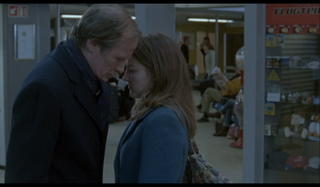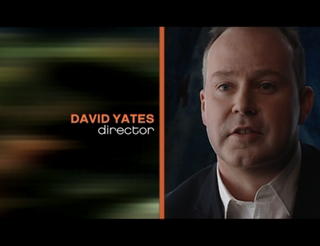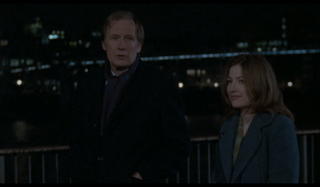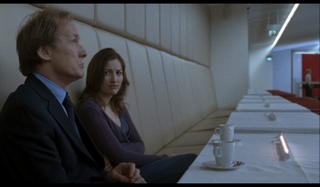Richard Curtis' THE GIRL IN THE CAFE
 A good friend of mine is fond of saying that the Romantic Comedy is “the most depressing of all film genres” because these films never present love as they truly are, but rather how we all wish they were. They ignore the real difficulty of relationships in favor of hearty laughs and easily corrected misunderstandings, which leads to an inevitable happy ending. (It’ll come as no surprise that his favorite recent films about relationships are 2046 and CLOSER.)
A good friend of mine is fond of saying that the Romantic Comedy is “the most depressing of all film genres” because these films never present love as they truly are, but rather how we all wish they were. They ignore the real difficulty of relationships in favor of hearty laughs and easily corrected misunderstandings, which leads to an inevitable happy ending. (It’ll come as no surprise that his favorite recent films about relationships are 2046 and CLOSER.) When it comes to spinning tales of romantic fantasy that make you laugh, make you cry and make you sigh with a heavy heart, there is nobody better than screenwriter Richard Curtis. Since bursting onto the scene with FOUR WEDDINGS AND A FUNERAL, he’s created our happiest recent memories of movie love. For me, his creative high point was the exquisite NOTTING HILL, which contains the quintessential Curtis line. (“I’m also just a girl, standing in front of a boy, asking him to love her.”) Curtis’ directorial debut was the Rom-Com epic LOVE, ACTUALLY. His definitive statement on the genre, Curtis supplied nearly a dozen happy endings and produced enough laughs and good cheer to melt the coldest heart. It brought about the question, where does Richard Curtis go from here?
When it comes to spinning tales of romantic fantasy that make you laugh, make you cry and make you sigh with a heavy heart, there is nobody better than screenwriter Richard Curtis. Since bursting onto the scene with FOUR WEDDINGS AND A FUNERAL, he’s created our happiest recent memories of movie love. For me, his creative high point was the exquisite NOTTING HILL, which contains the quintessential Curtis line. (“I’m also just a girl, standing in front of a boy, asking him to love her.”) Curtis’ directorial debut was the Rom-Com epic LOVE, ACTUALLY. His definitive statement on the genre, Curtis supplied nearly a dozen happy endings and produced enough laughs and good cheer to melt the coldest heart. It brought about the question, where does Richard Curtis go from here?Curtis’ latest film is a real curiosity. THE GIRL IN THE CAFÉ was never released in theatres, but instead played briefly on HBO (with minimal advertising) before appearing recently on DVD (with equally minimal advertising.) It begs the obvious question of why? Is the film terrible? The short answer is that THE GIRL IN THE CAFÉ is good, but a little too…I don’t know. It’s just not quite there as a satisfying film, but it was obviously made by talented people and it plays best as an interesting footnote to four of the artists involved.
 The story involves Bill Nighy, (who stole LOVE, ACTUALLY playing an aging rock star). He stars as Lawrence, a diplomatic assistant who walks into a café and meets Gina (Kelly Macdonald, who stole TRAINSPOTTING playing an underage party girl). The two cautiously form a relationship that is sweet and courteous. (Very repressed-British.) Things get tricky when he’s to attend a global conference and impulsively invites her to join him. Complications ensue, as they always do.
The story involves Bill Nighy, (who stole LOVE, ACTUALLY playing an aging rock star). He stars as Lawrence, a diplomatic assistant who walks into a café and meets Gina (Kelly Macdonald, who stole TRAINSPOTTING playing an underage party girl). The two cautiously form a relationship that is sweet and courteous. (Very repressed-British.) Things get tricky when he’s to attend a global conference and impulsively invites her to join him. Complications ensue, as they always do. The film was directed by David Yates. You’ve probably never heard of him, but his next film is HARRY POTTER AND THE ORDER OF THE PHOENIX, so I think quite a few film people may want to check this out as sort of a warm up. Truth is there’s very little here which gives me confidence that he’s the right man for the job. His visual style is shiny, but rather bland. And the film is much slower than it needs to be. He’s turned this story into something small, quiet and easy to dismiss. There are great performances, but I’m not sure how much credit goes to him.
The film was directed by David Yates. You’ve probably never heard of him, but his next film is HARRY POTTER AND THE ORDER OF THE PHOENIX, so I think quite a few film people may want to check this out as sort of a warm up. Truth is there’s very little here which gives me confidence that he’s the right man for the job. His visual style is shiny, but rather bland. And the film is much slower than it needs to be. He’s turned this story into something small, quiet and easy to dismiss. There are great performances, but I’m not sure how much credit goes to him.Richard Curtis wrote the lead for Bill Nighy, although it’s actually similar to Curtis’ Hugh Grant roles. There’s lots of awkward stammering and self-depreciation. But Nighy brings a weight Grant could never have provided. Lawrence is moving into old age with a slump-shouldered acceptance. Through Gina, he comes to realize that he has yet to accomplish any of his youthful goals. Gina affects him in ways he doesn’t realize until late in the game. (He doesn’t even notice that he’s falling for her until the moment he realizes he’s hopelessly in love.) It’s a rich role and Nighy (who seems to appear in every film to come from Britain lately) delivers his best performance.
 I’ve only seen a handful of Kelly Macdonald’s performances, and each one makes me long to see more. She’s a very underappreciated actress. Her role here is very tricky in that we’re deliberately told very little about her character. And it’s not so there can be some great reveal later. She’s just somebody who would rather learn about Lawrence than talk about herself. But Macdonald brings a full presence to the part. You feel there is much more to Gina then we will ever get to know. Her mystery never becomes frustrating, because she’s always in the emotional moment with Lawrence.
I’ve only seen a handful of Kelly Macdonald’s performances, and each one makes me long to see more. She’s a very underappreciated actress. Her role here is very tricky in that we’re deliberately told very little about her character. And it’s not so there can be some great reveal later. She’s just somebody who would rather learn about Lawrence than talk about herself. But Macdonald brings a full presence to the part. You feel there is much more to Gina then we will ever get to know. Her mystery never becomes frustrating, because she’s always in the emotional moment with Lawrence. Their relationship plays out mostly in a series of café’s, hotel rooms and long walks, and in some ways this is the British LOST IN TRANSLATION (but with a lot more plot and dialogue and a lot less moody contemplation.) Richard Curtis could have once again played his magnificent verbal waltz and we would have happily watched these two dance. But Curtis had a secondary agenda in mind.
Their relationship plays out mostly in a series of café’s, hotel rooms and long walks, and in some ways this is the British LOST IN TRANSLATION (but with a lot more plot and dialogue and a lot less moody contemplation.) Richard Curtis could have once again played his magnificent verbal waltz and we would have happily watched these two dance. But Curtis had a secondary agenda in mind.There’s a major subplot involving Lawrence’s conference, which is about helping the “extremely poor” (mostly in Africa). It’s obvious that Curtis takes the cause very seriously and wanted to use the cinema as a megaphone to bring attention to this global issue. The problem is the political agenda doesn’t live smoothly with the love story. Strangely enough, while the love story plays more true than Curtis usually dares to dwell, the politics are simplified and handled with all the realism of one of his romantic fables. (We could solve all the worlds problems if we really, really wanted to.)
So I understand why THE GIRL IN THE CAFÉ was never given a full theatrical release. But if you’re interested in the careers of Richard Curtis, Bill Nighy, Kelly Macdonald or want to check out the man who will be directing Harry Potter, then there’s something here that’s definitely worth your time. If you see the box advertising “From the writer of LOVE ACTUALLY and FOUR WEDDINGS AND A FUNERAL” and think this might be more of the same, you’re more likely to be very disappointed.




4 Comments:
The film is a political allegory about an everyman who tries to do good in high politics. In this case the everyman is a young woman who, through a set of coincidences, speaks up at the highest circles of international power. She inspires and shames an international summit to take strong action against the “casual holocaust” of death by extreme poverty in Africa and elsewhere. The plot is implausible (although not impossible) and the film’s action is slower than necessary. But the acting is excellent and the theme is heartwrenchingly played out.
I must say that my opinion of this movie is similar to that of Mr. Tannenbaum. Quite frequently I thought while watching the movie that it is implausible as can be. I would temporarily stop the movie and ponder, "Can this really happen?" All in all my answer would be, "Yes, but just barely."
But the plausibility of the movie is of secondary importance. Each of the main characters is fascinating, possessing the compassion and open-mindedness to be especially of interest. Although they know very little about each other, they do find that they have something very important in common, concern for the plight of those living in wretched destitution in the developing countries (in particular, subSaharan Africa). Their mutual desire to ameliorate the suffering in these regions has an effect on their romance. Though they share a common goal, indignant and distressed Gina (as Mr. Tannenbaum points out) seeks to accomplish her aim through heartfelt pleas and the shaming of those who remain indifferent, whereas Lawrence sees his job (a job he takes very seriously) as using logical argument and vigorous negotiation to gently sway the decisonmakers (who must deal with political realities). It is the discrepancy between these approaches to accomplish the same goal that leads to an outcome that I shall not call bittersweet (because I am hoping that they get back together again!).
I bought three copies of the DVD in order to pass copies around to my friends. The romantic story is only a mattress for the real point, which happens to be something really worth thinking about. Movies seldom talk cogently about important things, but this one does. We have beocme too comfortable with being diverted from what's important. As Kelly MacDonald points out repeatedly in the film, we would all rather our governments solve the problem of world poverty than start new wars. It is possible through the Millenium Development Goals, and the DVD actually includes a clip to refer us to the way it can be done: http://www.one.org. I have told many people that I consider this the best film (even for entertainment value) made in the 21st century.
I enjoy films that offer a heartwarming escape with relatable characters.
Post a Comment
<< Home